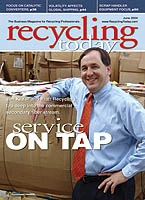
Certifiably Qualified
Placing a series of signs around one’s recycling facility and taking other seemingly mundane steps as part of a quality audit can certainly produce skeptical reactions among recycling industry veterans. For those who look at ISO (International Standards Organization) and related quality audit procedures with skepticism, the certification process can seem like a large distraction to contend with in a business where every minute counts.
However, an increasing number of scrap recycling firms are discovering a number of reasons to obtain certification. The most obvious is the ability to continue doing business with large Fortune 500 manufacturers who require their suppliers to obtain certification.
As long as manufacturers of automobiles, appliances, equipment, durable goods and packaging continue to champion quality audits, recyclers can expect to be invited to the party.
Discovering ways to improve safety, communication, processing efficiency and other segments of one’s business often result as a fortunate byproduct of a quality standards certification audit.
For recyclers, this could become even more apparent as recycling industry-specific certification processes become more established.
Several industry trade associations have established certification programs in the past two decades, including the CAR (Certified Automotive Recyclers) program for auto dismantlers, an electronic scrap recycling program created by the International Association of Electronics Recyclers and, most recently, a certification program for scrap recyclers that has been designed for ISRI (Institute of Scrap Recycling Industries Inc.) members.
ISRI has been developing the Scrap3 certification program (which is possibly subject to a name change later this year) throughout this decade. ISRI defines Scrap3 as "an integrated management system that . . . will become a framework that leads a company to manage its quality, environmental, health and safety issues using a systematic approach similar to what most companies utilize for managing trading or production activities."
Industry leaders see certification as a means of ensuring scrap generators and consumers a way to seek out and do business with companies who are serious about quality, safety and liability issues.
Those who seek and obtain the certification may accrue benefits—and that is certainly a selling point that ISRI is stressing to its members. ISRI says Scrap3 participants should notice fewer workplace accidents; measurable continual improvement; increased trust with mill consumers; and more consistent compliance with applicable laws and regulations.
The time and money spent to obtain certification could require advance planning, but failing to consider its merits could cause recyclers to miss significant opportunities to improve and profit from the experience.

Explore the June 2004 Issue
Check out more from this issue and find your next story to read.
Latest from Recycling Today
- Reconomy brands receive platinum ratings from EcoVadis
- Sortera Technologies ‘owning and operating’ aluminum sorting solutions
- IDTechEx sees electric-powered construction equipment growth
- Global steel output recedes in November
- Fitch Ratings sees reasons for steel optimism in 2025
- P+PB adds new board members
- BlueScope, BHP & Rio Tinto select site for electric smelting furnace pilot plant
- Magnomer joins Canada Plastics Pact





